- Home
- William Kennedy
Legs Page 6
Legs Read online
Page 6
'You guarantee he's no pigeon?"
"I guarantee," I said.
"How?"
"Every way but in writing."
"The bum. The fuckin' bum."
"He's all right. He won't talk. Lay off the telephone threats. He's got three kids and a nice wife. He's a nice Italian boy like yourself. He doesn't want to hurt anybody. He's an altar boy."
"Funeral for altar boys." said eloquent Jimmy.
"I guarantee you. What do you want from me? I'm his lawyer. He can't fire me. He hasn't even paid me yet."
"Fuckin' ". . .said Jimmy.
"Easy does it. He won't talk."
"Fuck . .
"I guarantee."
"You guarantee'?"
"I guarantee."
"You better fuckin' guarantee."
"I said I guarantee, and when I say I guarantee. I guarantee."
"Fuckin' well better . .
"Right. Jimmy. You got my word. Joe won't talk."
"Fuck."
* * *
Joe told me Jack Diamond, disguised as a Boy Scout, came through the bars of his cell one night and stood alongside Joe's bunk as he slept. "It's time to have your ears pierced," Jack said to Joe, and he shoved the blade of his Scout knife into Joe's left ear. Joe's brain leaked out through the hole.
"Help me," Joe yelled. "My ear is leaking." From the next cell somebody yelled, "Shut up, you looney son of a bitch."
But Joe didn't feel he was looney. He told the Bellevue alienist how it was when they wanted to know why he hid food under the bedclothes.
"That was for Legs Diamond. If he wants a bite to eat and I got nothing, that's trouble."
"Did it occur to you that the food would rot and give off a stench?"
"Rotten. it doesn't really matter. It's the offer that counts."
"Why did you cover your head with the blanket?"
"I wanted to be alone."
"But you were alone."
"I didn't want visitors."
"The blanket kept them away?"
"No, I could see them through the blanket. But it was better than nothing."
"Why did you hide the spoon?"
"So my visitors would have something to eat with."
"Then why did you scratch at the concrete floor with it?"
"I wanted to dig a place to hide so the visitors couldn't find me."
"How did you tear up your fingers?"
"When they took my spoon away."
"You dug at the concrete with your fingers?"
"I knew it'd take a long time; the nails'd have to grow back before I could dig again."
"Who visited you?"
"Diamond came every night. Herman Zuckman came, cut up the middle and half a dozen iron bars inside him, and wire wrapped around his stomach to keep the bars from falling out. He dripped muck and seaweed all over. 'What did you do wrong, Herman?' I said to him.
" 'Jew people have a tough life,' " he said.
"And I told him, 'You think it's easy being Italian?' "
"Any other visitors?"
"Walter Rudolph came in to cheer me up and I saw daylight through his bullet holes."
The night the dead fish leaped out of Herman's tuxedo Joe finally won his straitjacket.
* * *
The judge ordered the acquittal of Filetti after four days of trial, saying that the state had utterly failed to prove its case. Jack, still a fugitive, was never mentioned during the trial. Of the fifteen witnesses who testified, not one claimed to have seen Filetti actually shoot anybody. Joe Vignola, who was described as the state's most important witness, said he was dozing in another room when the shooting broke out and he saw nothing. His speech was incoherent most of the time.
Billy Reagan testified he was too drunk after drinking twenty shots of gin to remember what happened. Also, Tim Reagan's last words, originally said to have incriminated Diamond and Filetti, were not about them at all, a detective testified, but rather a violent string of curses.
* * *
Jack was a fugitive for eight months, and most of his gang, which was an amalgam of old-timers and remnants of Little Augie Orgen's Lower East Side Jews, drifted into other allegiances. The bond had not been strong to begin with. Jack took the gang over after he and Augie were both shot in a labor racketeering feud. Augie died, but you can't kill Legs Diamond.
Eddie Diamond died in January, 1930. Jack was still a fugitive when he met Kiki Roberts in April at the Club Abbey. and he immediately dropped Elaine Walsh. Half a dozen gangland murders were credited to his feud with Dutch Schultz during these months.
He saw the Jack Sharkey-Tommy Loughran fight at Yankee Stadium, as did Al Smith, David Belasco, John McGraw, and half the celebrities of New York. Jack couldn't miss such a show, even if he did have to raise a mustache and sit in an upper deck to avoid recognition. He bet on Loughran, like himself a Philadelphia mick; but Sharkey, the Boston sailor, won.
The crest of his life collapsed with the Hotsy shooting. All he'd been building to for most of a decade—his beer and booze operations, the labor racketeering he built with and inherited in part from Little Augie, his protection of the crooked bucketshops which bilked stock market suckers, an inheritance from Rothstein, his connections with the dope market, and, most ignominiously, his abstract aspiration to the leadership mantle that would somehow simulate Rothstein's—all this was Jack's life-sized sculpture, blown apart by gunpowder.
Dummy, you shoot people in your own club?
Jack got the word from Owney Madden, his old mentor from Gopher days, a quiet, behind-the-scenes fellow who, after doing his murder bit, came out of Sing Sing in 1923 and with a minimum of fanfare became the Duke of New York, the potentate of beer and political power in the city's underworld. Madden brought Jack the consensus sentiment from half a dozen underworld powerhouses: Go someplace else, Jack. Go someplace else and be crazy. For your own good, go. Or we'll have to kill you.
Jack's pistol had punctuated a decade and scribbled a finale to a segment of his own life. He had waged war on Schultz, Rothstein, and half a dozen lesser gang leaders in the Bronx, Jersey, and Manhattan, but he could not war against a consortium of gangs and he moved to the Catskills. I knew some of this, and I was certain Charlie Northrup knew much more, which is why Charlie's spitting beer at Jack and mocking him to his face did not seem, to say the least, to be in Charlie's own best interest.
* * *
After Charlie walked out of the Top o' the Mountain House Kiki said she was sick of the place and wanted to go someplace and have fun, and Jack-the-fun-seeker said okay, and we stopped at a hot dog stand, Kiki's choice, and sought out an aerial bowling alley which intrigued her and was a first for me. A genuine bowling ball was suspended on a long cable, and you stood aloof from the pins below and let the ball fly like a cannon shot. It then truly or falsely spun through the air and knocked over all the pins your luck and skill permitted. Kiki scored sixty-eight and almost brained the pinboy with a premature salvo, Jack got one fourteen and I won the day with one sixty-four. Jack was coming to respect my eye at least as much as he respected my legal acuity.
From bowling we went to miniature golf, where we played eighteen holes. Some holes you climbed stairs to and putted downhill. Kiki went first at one of those, and when you stood to the rear of her, as Jack and I did—Fogarty and The Goose were consuming soda pop elsewhere—you had total visibility of the girl's apparatus. She wore rolled silk stockings with frilly black garters about five inches above the knee, the sheerest pair of lace panties I'd theretofore seen, and areas of the most interesting flesh likely to be found on any mountain anywhere, and I also include the valleys.
I see her there yet. I see her also crossing and uncrossing her silkiness, hinting at secret reaches, dark arenas of mystery difficult to reach, full of jewels of improbable value, full of the promise of tawdriness, of illicitness, of furtiveness, of wickedness, with possibly blue rouge on the nipples, and arcane exotica revealed when she slips down the elastic waistb
and of those sheerest of sheers. They infected my imagination, those dark, those sheer, those elasticized arenas of that gorgeous girl's life.
I did not know that the infection would be prophetic of Kiki, prophetic of revelations of flesh, prophetic of panties. Nor did I know that this afternoon, with its sprinkles of rain interrupting our sport, would be the inspiration for Jack to initiate his organized shakedown of hot dog stands and miniature golf courses all over Greene and Ulster counties.
* * *
Kiki showed me a clipping once with a coincidence that made her believe in destiny. It's was an item out of Winchell, which said, "Dot and Dash is a mustache. Yaffie is an arrest. Long cut short is a sawed-off shotgun. White is pure alcohol. Simple Simon is a diamond .... " It appeared the day before Kiki met Jack at a nightclub party, and she was just about to go into rehearsal for a new musical, Simple Simon.
I look back to those early days and see Kiki developing in the role of woman as sprite, woman as goddess, woman as imp. Her beauty and her radiance beyond beauty were charms she used on Jack, but used with such indifference that they became subtle, perhaps even secret, weapons. I cite the dance floor episode at the Top o' the Mountain House as as example, for she had small interest in whether it was Jack who danced with her or not. Her need was to exult in her profession, which had not been chosen casually, which reflected a self dancing alone beneath all the glitter of her Broadway life. "I must practice my steps," she said numerous times in my presence, and then with a small radio Jack had given her she would find suitable music and, oblivious of others, go into her dance, a tippy-tap-toe routine of cosmic simplicity. She was not a good dancer, just a dancer, just a chorus girl. This is not a pejorative reduction, for it is all but impossible for anyone to be as good a chorus girl as Kiki proved to be, proved it not only on stage—Ziegfeld said she was the purest example of sexual nonchalance he'd ever seen—but also in her photogenicity, her inability to utter a complex sentence, her candor with newspapermen, her willingness to trivialize, monumentalize, exalt, and exploit her love for Jack by selling her memoirs to the tabloids—twice—and herself to a burlesque circuit for the fulfillable professional years of her beauty and the tenacious years of Jack's public name. More abstractly she personified her calling in her walk, in her breathing, in the toss of her head, in her simultaneous eagerness and reluctance to please a lover, in her willingness to court wickedness without approving of it, and in her willingness to conform to the hallowed twentieth-century chorus-girl stereotype that Ziegfeld. George White, Nils T. Granlund, the Minskys, and so many more men, whose business was flesh, had incarnated, and which Walter Winchell, Ed Sullivan, Odd McIntyre, Damon Runyon, Louis Sobol, and so many others, whose business was to muse and gossip on the ways of this incarnated flesh, had mythicized. And as surely as Jack loved pistols, rifles, machine guns—loved their noise, their weight, their force, the power they passed to him, their sleekness, their mechanical perfections, their oily surfaces as balm for his ulcerated gangster soul—so did he cherish the weaponistic charms of Kiki. And as the guns also became his trouble as well as his beloved, so became Kiki. She did not know such ambivalence was possible when she met Jack, but her time alone with The Goose on the mountaintop was the beginning of her wisdom, painful wisdom which love alone could relieve.
* * *
A quick summer storm blew up and it started to rain as Fogarty drove Kiki, Jack, and me back to Haines Falls after the golf. There was talk of dinner, which I declined, explaining I had to get back to Albany. But no, no, Jack wouldn't hear of my leaving. Wasn't I done out of a champagne lunch by the canary scene? We went to the Top o' the Mountain House to freshen up before we ate, and Jack gave me the room The Goose had been using, next to Kiki's. Jack joined Kiki in her room for what I presumed was a little mattress action, and I pursued a catnap. But the walls were thin and I was treated instead to a memorably candid conversation:
"I'm going back to New York," Kiki said.
"You don't mean it," Jack said.
"'I don't care what you do. I'm not staying in this prison with that goon. He never says a word."
"He's not good at talking. He's good at other things. Like you."
"I hate having a bodyguard."
"But your body deserves guarding. "
"It deserves more than that. "
"You're very irritable tonight. "
"You're damn right I am."
"You've got a right to be, but don't swear. It's not ladylike."
"You're not so particular in bed about ladylike."
"We're not in bed now."
"Well, I don't know why we're not. I don't see you for two days and you show up with a stranger and don't even try to be alone with me."
"You want a bed, do you? What do you want to put in it?"
"How's this? How does it look?"
"Looks like it's worth putting money into."
"I don't want money in it."
"Then I'll have to think of something else."
"I love to kiss your scars," Kiki said after a while.
"Maybe you'll kiss them all away," Jack said.
"I wouldn't want to do that. I love you the way you are."
"And you're the most perfect thing I've ever seen. I deserve you. And you don't have any scars."
"I'm getting one."
"Where?"
"Inside. You cut me and let me bleed, and then I heal and you leave me to go back to your wife. "
"Someday I'll marry you."
"Marry me now, Jackie."
"It's complicated. I can't leave her. She's in a bad way lately, depressed, sick."
"She goes to the movies. She's old and fat."
"I've got a lot of money in her name."
"She could run off with it, wipe you out."
"Where could she run I couldn't find her?"
"You trust her, but you don't trust me alone."
"She's never alone."
"What is she to you? What can she give you I can't?"
"I don't know. She likes animals."
"I like animals."
"No, you don't. You never had a pet in your life."
"But I like them. I'll get a pet. I'll get a cat. Then will you marry me?"
"Later I'll marry you."
"Am I your real lay?"
"More than that."
"Not much more. "
"Don't be stupid. I could lay half the town if I wanted to—Catskill, Albany, New York, any town. Unlimited what I could lay. Unlimited."
"I want a set of those Chinese balls. The metal ones."
"Where'd you hear about those?"
"I get around. I get left alone a lot now, but I didn't always."
"What would you do with them?"
"What everybody does. Wear them. Then when nobody's around to take care of me and I get all hot and bothered, I'd just squeeze them and they'd make me feel good. I want them. "
"Will you settle for an Irish set?"
"Can I keep them with me?"
"I'll see they don't get out of range. "
"Well, see to it then."
* * *
"Everything was still incredible with me and Jack back then," Kiki said to me much later, remembering the sweet time. "It was thrilling just to see him from a new angle, his back, or his stomach, any part of his bare skin. He had gouges and scars from knife fights when he was a kid, and where he'd been shot and kicked and beaten with clubs and boards and pipes. I got sad up on the mountain one night looking at them all. But he said they didn't hurt him anymore, and the more I looked at them and touched them, the more they made his body special, the way his head was special. It wasn't an all white and smooth and fatty body like some I've seen but the body of a man who'd gone through a whole lot of hell. There was a long red scar on his stomach just above his belly button, where he'd almost died from a cut in a knife fight over a girl when he was fifteen. I ran my tongue over it and it felt hot. I could almost taste how much it hurt when he'd got it and what it meant now. To
me it meant he was alive, that he didn't die easy. Some people could cut their little toe and give up and bleed to death. Jack never gave up, not his body, not anything."
* * *
Well, we all did have dinner on the mountain, and then I insisted on leaving. "It's been a special day," I told Jack, "but an odd one."
"What's so odd about it?"
"Well, how about buying a paperweight for starters?"
"Seems like an ordinary day to me," he said. I assumed he was kidding. But then he said, "Come to dinner next week. I'll have Alice cook up another roast. I'll call you during the week to set it up. And think about Europe." So I said I would and turned to Kiki, whom I'd spoken about forty words to all day. But I'd smiled her into my goodwill and stared her into my memory indelibly, and I said, "Maybe I'll see you again, too," and before she could speak Jack said, "Oh you'll see her all right. She'll be around."
"I'll be around he says," Kiki said to me in a smart-ass tone, like Alice's whippy retort had been earlier in the day. Then she took my hand, a sensuous moment.
Everything seemed quite real as I stood there, but I knew when I got back to Albany the day would seem to have been invented by a mind with a faulty gyroscope. It had the quality of a daydream after eight whiskeys. Even the car I was to ride down in—Jack's second buggy, a snazzy, wire-wheeled, cream-colored Packard roadster The Goose was using to chauffeur Kiki around the mountains—had an unreal resonance.
I know the why of this, but I know it only now as I write these words. It took me forty-three years to make the connection between Jack and Gatsby. It's should have been quicker, for he told me he met Fitzgerald on a transatlantic voyage in 1926, on the dope-buying trip that got him into federal trouble. We never talked specifically about Gatsby, only about Fitzgerald, who, Jack said, was like two people, a condescending young drunk the first time they met, an apologetic, decent man the second time. The roadster was long and bright and with double windshields, and exterior toolbox, and a tan leather interior, the tan a substitute, for Gatsby's interior was "a sort of green leather conservatory." But otherwise it was a facsimile of the Gatsby machine, and of that I'm as certain as you can be in a case like this. Jack probably read Gatsby for the same reason he read every newspaper story and book and saw every movie about gangland. I know he saw Von Sternberg's Underworld twice; we did talk about that. It was one way of keeping tabs on his profession, not pretension to culture. He mocked Waxey Gordon to me once for lining his walls with morocco-bound sets of Emerson and Dickens.

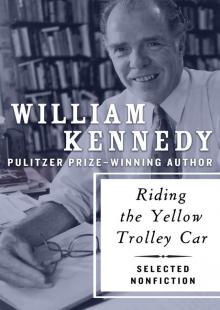 Riding the Yellow Trolley Car: Selected Nonfiction
Riding the Yellow Trolley Car: Selected Nonfiction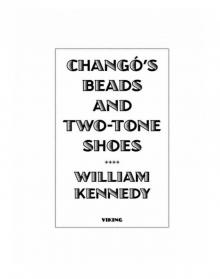 Changó's Beads and Two-Tone Shoes
Changó's Beads and Two-Tone Shoes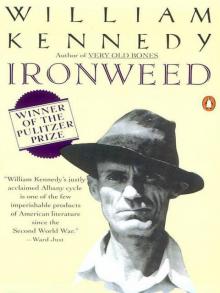 Ironweed
Ironweed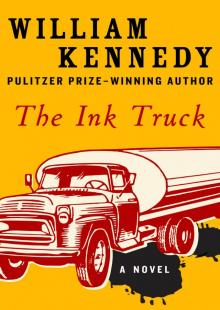 The Ink Truck
The Ink Truck Billy Phelan's Greatest Game
Billy Phelan's Greatest Game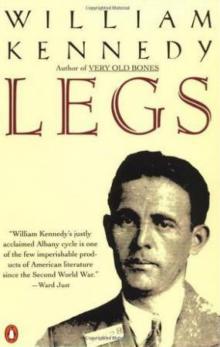 Legs
Legs Very Old Bones
Very Old Bones The Last Mission
The Last Mission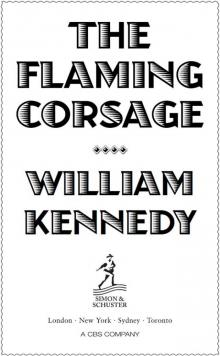 The Flaming Corsage
The Flaming Corsage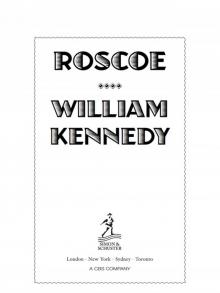 Roscoe
Roscoe Quinn's Book
Quinn's Book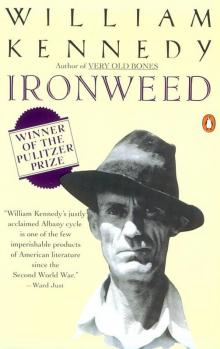 Ironweed (1984 Pulitzer Prize)
Ironweed (1984 Pulitzer Prize)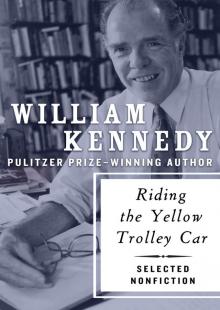 Riding the Yellow Trolley Car
Riding the Yellow Trolley Car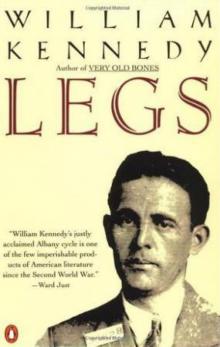 Legs - William Kennedy
Legs - William Kennedy